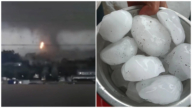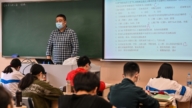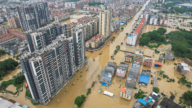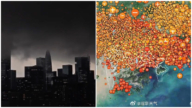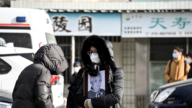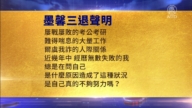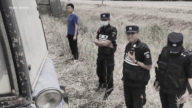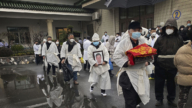【新唐人2014年12月27日訊】最近一年多來,隨著中共當局對新疆地區的高壓維穩政策不斷升級,越來越多的維吾爾族人試圖越過邊境,逃往東南亞國家避難,但多數遭到了境內外警方攔截。日前,廣西警方在中越邊界抓捕了20多名維吾爾人,並槍斃了其中一人,還將他們稱為「宗教極端份子」。那麼,外界是如何看待當局的這一說法呢?
據中共喉舌媒體《央視》報導說,中共警方12月21號晚上,在中越邊境處破獲一起「宗教極端分子」偷越邊境,逃往越南的案件,過程中擊斃一人,拘捕21人。而《央視》在報導這一事件時,並沒有具體說明這些「宗教極端份子」來自甚麼地區。
英國廣播公司《BBC》的報導認爲,這22名試圖越境的中國人應該來自新疆,是維吾爾族穆斯林。
總部在德國的世界維吾爾大會發言人迪里夏提表示,這些試圖逃離中國的人,並不是當局口中所謂的「宗教極端份子」,而是因為承受不住中共的高壓政策,被迫背井離鄉的維吾爾族人民。
世界維吾爾大會發言人阿里木則呼籲,希望中國民眾不要相信當局欺騙抹黑式的洗腦宣傳,而對維吾爾人產生誤解。
世界維吾爾大會發言人阿里木: 「最近我們看到有很多維吾爾族難民他們去東南亞國家,泰國、越南、緬甸、馬來西亞等國。中國政府把這些維族人聲稱為所謂的『極端份子』、『恐怖份子』、『分裂份子』之類的。但事實上不是如此,因為我們看到這些離開自己國土和家園的維族人,不僅僅是所謂的年輕人,我們看到的是很多家人,他們有丈夫有妻子,有一兩歲、三四歲的孩子。」
據《自由亞洲電臺》引述「維吾爾人全工程」資深研究員亨利克•薩斯耶夫斯基的觀點指出,中共當局不經任何法律程序就把逃離中國的維吾爾人說成是「宗教極端份子」,使人質疑其目的,很可能是為了給中國警察擊斃其中一人提供辯解的藉口。亨利克甚至懷疑,中國警察向這些人使用了不適當的、過度的、非法的武力。
對此,幾年前為躲避當局迫害而被迫偷渡到泰國的譚偉昌,也提出了同樣看法。
流亡泰國的難民譚偉昌: 「它這個所謂『宗教極端份子』是個口袋罪,很寬泛的一個概念,它就像『洩露國家機密』、還有『尋釁滋事』這種罪名,它很模糊,沒有精確的指出是甚麼東西,中共經常利用這個來打擊各種類型的,它認為的『敵人』或者是對它『不利』的人。」
最近幾年,有越來越多的維吾爾人通過寮國和緬甸,前往泰國或其他東南亞國家,以躲避當局的迫害。據《自由亞洲》報導,目前在泰國境內,已經有超過300名來自中國的維吾爾人等待難民身份,再轉往第三國。
譚偉昌告訴《新唐人》記者,幾年前在泰國境內,幾乎看不到維族人申請難民,但是最近一段時間,前往泰國申請難民的維吾爾人明顯增加。
譚偉昌:以前我在曼谷的時候,確實沒怎麼聽說過有維族人進入泰國來申請難民,但是近來就看到至少有兩例,特別是前段時間,泰國說拘禁了100多名維吾爾人那個案例,從這個角度來看,我覺得實際上這個迫害更加嚴重,新疆當地的宗教迫害是加劇了。」
印尼華僑黃安明先生在印尼排華期間回到大陸後,反遭中共當局迫害,不得不再次逃到了泰國。他表示,即使維吾爾族人順利到達泰國,也並不意味他們安全了。據了解,雖然泰國在過去幾十年中接受過上百萬難民,但實際上泰國並不是1951年的難民公約簽署國,難民身份在泰國是不被承認和保護的,而且隨時面臨被逮捕和遣返的危險。
在泰國避難的原印尼華僑黃明安:「現在有些(難民)已經抓進了拘留中心 (維吾爾人)被抓了兩次了,但是那些人都是在南部被抓的 他們兩次(偷渡)進來到了南部的一個(聚集)點。那些警察去包圍去把他們抓了,抓了兩批人。」
據《BBC》報導,在泰國總理巴育訪問中國之際,中共外交部於12月24號發表了中泰聯合新聞公報,其中提到,兩國將進一步加強「預防和根除」有組織偷渡等打擊跨國犯罪的合作。這一消息對於那些試圖逃離中共當局迫害和暴政的人來說,無疑是雪上加霜。
採訪/陳漢 編輯/張天宇 後製/蕭宇
Regime Shot and Killed a Uyghur Extremist
High pressure stability maintenance policy has been ever
increasing in Xinjiang;
subsequently causing many more Uyghurs to try to cross
the borders seeking asylum in Southeast Asian countries.
Many of them have been intercepted by police from both sides.
Recently, Guangxi police arrested more than 20 Uyghurs
at the Vietnam border and shot one dead.
Police claimed they are “religious extremists."
But, how was this incident viewed by the outside world?
According to the Chinese Communist Party (CCP) mouthpiece,
CCTV, one religious extremist group was cracked down by police
while trying to cross the Sino-Vietnam border
on the evening of Dec. 21.
Police shot one man dead and arrested 21.
CCTV provided no specific information
about where these extremists were from.
BBC Chinese suspected they are Uyghurs
from China’s far western region of Xinjiang.
World Uyghur Congress spokesman Dilshat Reshit believes
these are Uyghurs who could not stand the CCP’s
high-handed policy and were forced to flee China,
rather than so-called “religious extremists".
World Uyghur Congress spokesman Alim Seytoff also appealed
to the Chinese people not to trust the misleading propaganda
of the CCP that aims to discredit the Uyghurs
and brainwash the Chinese.
Alim Seytoff: “We have seen many Uyghurs take refuge
in Southeast Asian countries such as Thailand, Vietnam,
Myanmar and Malaysia recently.
The Chinese government claims they are all so-called
“extremists", “terrorists", “separatists" and the like.
But in fact we saw these people who left their land and homes
are many younger generations and groups of families
of husband and wife, with infants and toddlers."
Uyghur Human Rights Project senior researcher
Henryk Szadziewski, believed the regime has labeled
this person a religious extremist
in order to cover the police tracks.
He also suspected Sunday’s shooting death might have been
an “extrajudicial killing" by Chinese authorities
with excess and unreasonable force, according to RFA.
In this regard, a refugee in exile in Thailand shares
a similar point of view.
Chinese refugee in Thailand, Tan Weichang: “This ‘religious
extremists’ is a pocket crime with a very broad concept.
It is similar to charges such as “leaking state secrets"
and “picking quarrels and provoking troubles."
They are very vague.
The CCP has often used these charges to defeat its so-called
enemy or person to its disadvantage.
In recent years, many more Uyghurs have escaped
the persecution by going through Laos or Myanmar
to reach Thailand or elsewhere in Southeast Asia.
Nearly 300 Uyghurs have been held in immigration detention
camps in Thailand, according to RFA.
Tan Weichang tells NTD TV that Uyghur refugees were very
rare in Thailand a few years ago.
But recently, the number has increased significantly.
Tan Weichang: “When I was in Bangkok, I rarely heard of Uyghurs
seeking refuge in Thailand.
But, just recently I have already heard two cases.
In particular the 100 Uyghur detainees in Thailand just
a while ago.
It tells me that the persecution is getting more severe.
Religious suppression in Xinjiang is exacerbated. “
Huang Mingan was an Indonesian Chinese who had returned
to China during the anti-Chinese riots of Indonesia.
The persecution from the CCP had him once again flee
to Thailand.
He indicates that even if the Uyghurs successfully reach
Thailand, it does not guarantee their safety.
Thailand is a non-member of the 1951 Convention
Relating to the Status of Refugees.
Thus, a refugee in Thailand is not recognized or protected,
but rather at risk of arrest and repatriation.
Huang Mingan: “Now some (refugees) have been arrested
and brought into the detention center;
(The Uyghurs) arrested twice in the south. They smuggled
to a hideout place in the south twice.
The police also went there twice and caught them there."
In a joint communique released on Dec. 24 by China’s foreign
ministry following a visit to Beijing by Thai Prime Minister
Prayut Chan-o-cha, both countries have agreed to enhance
cooperation in “the prevention and the eradication"
of illegal immigration and terrorism.
It is undoubtedly a worsening situation for the refugees
who try to escape the CCP persecution and tyranny.
Interview/ChenHan Edit/Zhang Tianyu Post-Production/XiaoYu



